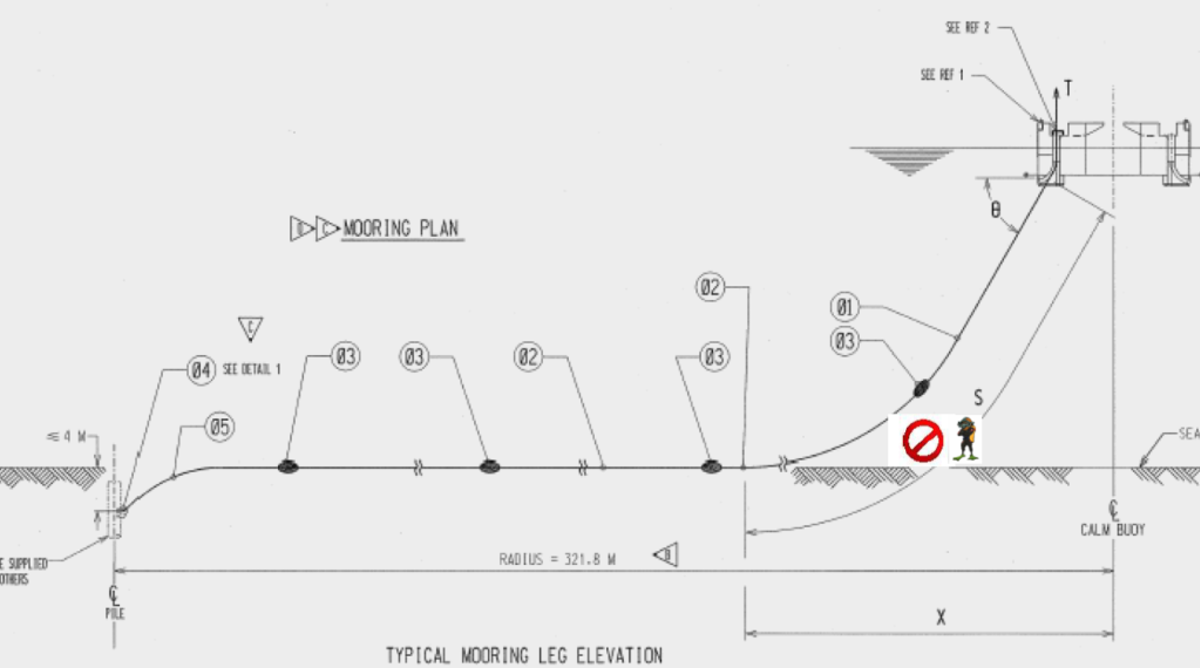Diver trapped by anchor chain
- Safety Flash
- Published on 17 December 2019
- Generated on 1 March 2026
- IMCA SF 30/19
- 2 minute read
Jump to:
During diving operations to locate a pipeline end manifold (PLEM) near a single point mooring (SPM), a diver was trapped by an anchor chain.
What happened?
The incident occurred when Diver 1, searching for the PLEM, went underneath the anchor chain without realising it. His umbilical got caught and he turned back to find that it was trapped between the chain and the seabed. He tried without success to free it, and then tried to pass back under the chain, which moved at that moment, trapping the diver at the chest and left shoulder. Diver 2 was deployed to rescue Diver 1; he cut the umbilical and assisted Diver 1 back to the basket and safely back to the surface. Decompression was not necessary owing to the shallow water depth (10-16m) and bottom time.
Diver 1 was diagnosed in the shipboard hospital as having suffered a minor thorax trauma and was discharged for rest.

What went wrong?
Investigation noted the following contributing factors:
- Risk assessment and procedures:
- hazard identification was neither suitable nor sufficient for the project
- company manuals and procedures were not followed.
- hazard identification was neither suitable nor sufficient for the project
- The client provided necessary information only at a late stage.
- There were “adverse environmental parameters” – heavy seas were causing significant movements of buoy and chains.
- The vessel was in the wrong place, and the vessel’s movements were inappropriate for the ongoing operation; i.e. the dive basket moved during dive while diver was on the bottom.
What actions were taken?
Our Member took a number of detailed actions and recommendations which may be summarised thus:
- More effective hazard identification (HAZID).
- Ensure all necessary information for safe operations is available in a timely way.
- Reiterate the full authority and responsibility of the Dive Supervisor in diving operations.
Featured Safety Flashes
-
IMCA SF 20/19
23 August 2019
-
-
IMCA SF 05/16
24 February 2016
-
IMCA SF 15/09
23 October 2009
IMCA Safety Flashes summarise key safety matters and incidents, allowing lessons to be more easily learnt for the benefit of the entire offshore industry.
The effectiveness of the IMCA Safety Flash system depends on the industry sharing information and so avoiding repeat incidents. Incidents are classified according to IOGP's Life Saving Rules.
All information is anonymised or sanitised, as appropriate, and warnings for graphic content included where possible.
IMCA makes every effort to ensure both the accuracy and reliability of the information shared, but is not be liable for any guidance and/or recommendation and/or statement herein contained.
The information contained in this document does not fulfil or replace any individual's or Member's legal, regulatory or other duties or obligations in respect of their operations. Individuals and Members remain solely responsible for the safe, lawful and proper conduct of their operations.
Share your safety incidents with IMCA online. Sign-up to receive Safety Flashes straight to your email.